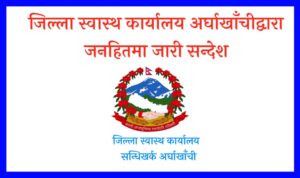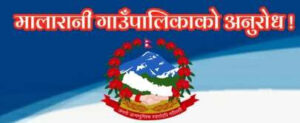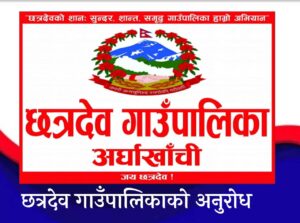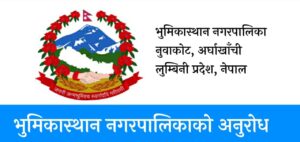 काठमाडौं । परराष्ट्र मन्त्रालयले मेसिन रिडेबल पासपोर्ट वितरणलाई सरल र सहज बनाउन ६८ जिल्ला र देशबाहिर रहेका ३२ वटा दूताबासमा लाइभ इन्रोलमेन्ट सेन्टर खोल्ने भएको छ । परराष्ट्र मन्त्रालयमा आयोजित पत्रकार भेटघाट कार्यक्रममा प्रवक्ता अर्जुन बहादुर थापाले छिट्टै नै लाईभ इन्रोलमेन्ट सेन्टर खोल्ने प्रक्रिया अघि बढाउने जानकारी दिए । इन्रोलमेन्ट सेन्टरका लागि करिब एक अर्ब रुपैया लाग्ने अनुमान गरिएको छ । सो सेन्टर खोलिएपछि इन्टरनेटको माध्यमबाट विवरण भरिएका पार्सपोर्टका फारम सेन्टरबाट सीधै राहदानी बिभागमा आउने छन् ।
काठमाडौं । परराष्ट्र मन्त्रालयले मेसिन रिडेबल पासपोर्ट वितरणलाई सरल र सहज बनाउन ६८ जिल्ला र देशबाहिर रहेका ३२ वटा दूताबासमा लाइभ इन्रोलमेन्ट सेन्टर खोल्ने भएको छ । परराष्ट्र मन्त्रालयमा आयोजित पत्रकार भेटघाट कार्यक्रममा प्रवक्ता अर्जुन बहादुर थापाले छिट्टै नै लाईभ इन्रोलमेन्ट सेन्टर खोल्ने प्रक्रिया अघि बढाउने जानकारी दिए । इन्रोलमेन्ट सेन्टरका लागि करिब एक अर्ब रुपैया लाग्ने अनुमान गरिएको छ । सो सेन्टर खोलिएपछि इन्टरनेटको माध्यमबाट विवरण भरिएका पार्सपोर्टका फारम सेन्टरबाट सीधै राहदानी बिभागमा आउने छन् ।
जसका कारण राहदानी निर्माण र वितरणमा अहिले भईरहेको ढिलाई अन्त हुने बताइएको छ । दैनिक सात सय ५० राहदानी वितरण गर्ने क्षमता भएको विभागमा दैनिक एक हजारभन्दा बढी आवेदन पर्ने गरेको बताइएको छ । राहदानी विभागले एमआरपी वितरणबाट मात्रै दैनिक एक करोड रुपैयाँ राजश्व उठाइरहेको पनि जनाइएको छ ।
कार्यक्रममा दिइएको जानकारी अनुसार मन्त्रालयले १५ हजार रुपैयाँ राजश्व लिएर ४८ घण्टाभित्रै राहदानी दिने व्यवस्था पनि गर्न लागेको छ । सामान्यतः एमआरपीको लागि पाँच हजार रुपैया दस्तुर लाग्ने भएपनि सेवाग्राहीले १० हजार रुपैयाँ तिरेर ७ दिनमा राहदानी लिनसक्ने व्यवस्था रहेको छ ।
पासपोर्ट बनाउन दक्षिण एसियामा सबै भन्दा महँगो देश नेपाल हो। भने अन्य देशहरुले अत्यान्तै सस्तो-सुलब मुल्यमा जनतालाई पासपोर्ट उपलब्ध गराएका छन। यस सम्बन्धी पुरा समाचार यहाँ गएर हेर्न सकिनेछ।
RSS
Nepal’s passport costliest in South Asia
Despite the lengthy and often frustrating process, the fees that the Nepal government charges its citizens for passport s remain the highest in all of South Asia.
The government currently charges Rs 5,000 ($57.27) to issue a passport with 60 pages through the normal process and Rs 10,000 ($114.54) to fast track the document. It takes around six weeks to get a passport through normal process and seven days through the fast track. This rate is almost double that of other South Asian countries. Other nations in the region with better per capita income issue passport s at much lower cost. In India, it costs IRs 1,000 ($20) and IRs 1,500 ($30) for a new passport with 36 pages and 60 pages respectively. The cost of acquiring a passport in Pakistan, Bangladesh, Sri Lanka, Bhutan and the Maldives is $30, $25, $25, $18.4 and $36 respectively. Sri Lanka issues a different passport for workers going to the Middle East and South Asian countries, which cost only $10.
Officials at the Ministry of Foreign Affairs (MoFA) admitted that the cost is steep for common people to bear, taking into account that service delivery is also slow. MoFA spokesperson Arjun Bahadur Thapa said that the cost was determined by the Finance Ministry. �Stakeholders must have followed certain standards or criteria while fixing the price. If Nepalis are really paying more than the citizens of other South Asian countries, it�s really sad,� said Thapa. He informed that they could revise the fees only if higher authorities directed them to.
Service seekers also have to wait comparatively longer in Nepal to acquire a passport through ordinary process. For instance, it takes 10 days to get a passport in Sri Lanka through the normal process and a single day to issue an urgent passport , according to the Sri Lankan Department of Immigration and Emigration.
These higher fees have hit migrant workers particularly hard as they are the largest group seeking passport s.
Around 1,500 people obtain work permits from the Department of Foreign Employment on a daily basis in order to go overseas for employment. The high cost involved in the processing of passport s has also increased the overall recruitment cost for migrant workers going to the Gulf. The total cost of obtaining a passport could rise three times higher as the majority are compelled to travel to the Capital and the District Administration Office (DAO) for the purpose.
�It�s true that poor people living outside the Capital are compelled to spend much in transportation, accommodation and food while waiting in queues for passport but our resources and equipment should also be considered,� said Thapa.
The MoFA�s decision not to hand down complete authority to the district authorities to issue passport s has only lengthened the process. It takes around two months for common people to get a passport from the district. The DAO collects the application form in chunks and sends them to the ministry which then issues and sends passport s back to the districts. The ministry issues around 1,200 passport s everyday.
 काठमाडौं । परराष्ट्र मन्त्रालयले मेसिन रिडेबल पासपोर्ट वितरणलाई सरल र सहज बनाउन ६८ जिल्ला र देशबाहिर रहेका ३२ वटा दूताबासमा लाइभ इन्रोलमेन्ट सेन्टर खोल्ने भएको छ । परराष्ट्र मन्त्रालयमा आयोजित पत्रकार भेटघाट कार्यक्रममा प्रवक्ता अर्जुन बहादुर थापाले छिट्टै नै लाईभ इन्रोलमेन्ट सेन्टर खोल्ने प्रक्रिया अघि बढाउने जानकारी दिए । इन्रोलमेन्ट सेन्टरका लागि करिब एक अर्ब रुपैया लाग्ने अनुमान गरिएको छ । सो सेन्टर खोलिएपछि इन्टरनेटको माध्यमबाट विवरण भरिएका पार्सपोर्टका फारम सेन्टरबाट सीधै राहदानी बिभागमा आउने छन् ।
काठमाडौं । परराष्ट्र मन्त्रालयले मेसिन रिडेबल पासपोर्ट वितरणलाई सरल र सहज बनाउन ६८ जिल्ला र देशबाहिर रहेका ३२ वटा दूताबासमा लाइभ इन्रोलमेन्ट सेन्टर खोल्ने भएको छ । परराष्ट्र मन्त्रालयमा आयोजित पत्रकार भेटघाट कार्यक्रममा प्रवक्ता अर्जुन बहादुर थापाले छिट्टै नै लाईभ इन्रोलमेन्ट सेन्टर खोल्ने प्रक्रिया अघि बढाउने जानकारी दिए । इन्रोलमेन्ट सेन्टरका लागि करिब एक अर्ब रुपैया लाग्ने अनुमान गरिएको छ । सो सेन्टर खोलिएपछि इन्टरनेटको माध्यमबाट विवरण भरिएका पार्सपोर्टका फारम सेन्टरबाट सीधै राहदानी बिभागमा आउने छन् ।



